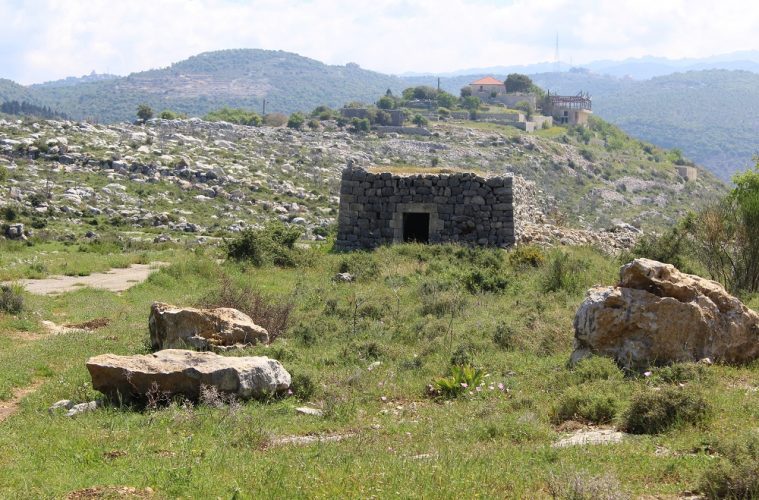- Casa: Batroun
- Distance from Beirut: 67 km
- Altitude: 520 m
- Access: Jisr Al Madfoun – SmarJbeil – Jran – Abdelli – Jrabta
The name is probably derived from a Greek word, meaning “the cave”, and the Syriac pronunciation Grabta means the village of water. It has the most beautiful Phoenician inscriptions on the rocks representing ancient Phoenician religious rites. Geographically, it is a small village, but nonetheless historically significant. Here, the poet Abdallah Abi Abdallah established the first garden in Lebanon, which is now called “the Poets’ Garden”. It is distinguished by historical men like the journalist Khayrallah Khayrallah, known for his defensive situations of his nation and the Arab World. He was condemned to death in 1916 by order from Jamal Basha and was killed in Tunisia in 1930. The village is distinguished by its narrow mountain roads that make you feel you are inside a tunnel.
- Mar Youssef Convent (Saint Joseph Convent for Lebanese Nuns Order):
Saint Joseph Convent Al Dahr was established in Jrabta in 1897, and the people from Maad played an important role in building and starting the convent. St. Rafqa played the most important part in this, encouraging the Lebanese nuns, especially Sister. Takla Doumit, her student in Maad, to move to it, considering her a blessing to the convent.
The inscriptions and documents of the convent of Jrabta, which contain petitions and letters of thanks to the Patriarch from the villages of Bejjeh, Ghalboun, Ain Kfaa, Jrabta, and Maad with a tribute for building the convent.
There were a few different reasons and circumstances for building the convent:
- The harsh climate in the convent of Aytou, at 1200m altitude, known for its cold and snowy weather throughout the year.
- Sister Ursula Doumit’s illness.
- The location was selected according to the Lebanese decision order: “Nuns’ Convents cannot be built except in safe places, away from any foreign attack, that is, among Catholic villages only”.
Nowadays there are 33 nuns, and the convent has an important position among shrines, visited by a huge number of visitors from different religions for blessings from the shrine of Saint Rafqa. Nuns are responsible for all the traditional handcraft work, preparing food provisions and marzipan (from almond paste), (06/ 720 402), www.strafqa.org.
- Mar Abda Parish Church (St. Abdon):
Built by crusaders, the key is with Mr. Merheb Merheb (76/303 493)
- Mar Nohra Church (St. Lucius):
Dated to the mid-18th century, in ruins.
- Al Saydeh Church (Our Lady):
It was built in 1914. The key is with Mr. Merheb Merheb (76/303 493).
- Mar Challita Monastery:
It was destroyed by the Mamluks in 1300. Today, an oak tree is growing up there, next to the first tomb of St Rafqa; this tree in known as “the oak of Mar Challita”.
- Remains of a Citadel: facing Smar Jbeil Citadel, there are wells and ancient sarcophagi carved in the rock from the east side of St. Abdon’s church.
Local agriculture: Honey, olives, almonds, poultry farms.
Feast of Mar Nohra: August 31; traditional dinner in the church square.
Contact Father Toni Nohra : (71/ 308 331)
Eid El Saydeh (The Assumption of Our Lady feast): August 14; Traditional dinner in the church square. Contact Mr. Merheb Merheb (76/ 303 493)
Visit to the BIOMASS organic farm: Organic agriculture, educational farm activities, healthy Lebanese restaurant, park and playground. Miss Pamela Daccash (03/836 552); www.biomasslb.com, Fb Biomass-Organic Products
BIOMASS restaurant: organic Lebanese food (03/ 836 552)
Handcraft and homemade food shop: in St. Joseph convent of Jrabta: (dairy products, flower water, rose water, marzipan…) (06/ 720 402)
Wadaya Greenland (B&B-camping-chair renting) St.Rafqa main road – Jrabta
Fb: Wadaya Greenland. Mr. Antoine Abi Nader (03/212 757)
Mrs. Jamal Awad Sawma Daher: (70/354 592)
Mrs.Laudy Matta: (03/373 646)

